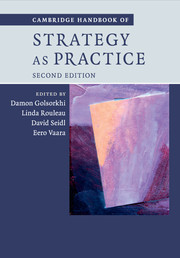Book contents
- Frontmatter
- Contents
- List of figures
- List of tables
- List of boxes
- List of contributors
- Preface to the Second Edition
- Introduction: what is strategy as practice?
- Part I Ontological and Epistemological Questions
- Part II Theoretical Resources: Social Theory
- Part III Theoretical Resources: Organization and Management Theories
- Part IV Methodological Resources
- 24 Using ethnography in strategy-as-practice research
- 25 Researching strategists and their identity in practice: building ‘close-with’ relationships
- 26 Studying strategizing through biographical methods: narratives of practices and life trajectories of practitioners
- 27 Researching everyday practice: the ethnomethodological contribution
- 28 Critical discourse analysis as methodology in strategy-as-practice research
- 29 Studying strategy as practice through historical methods
- 30 Quantitative methods in strategy-as-practice research
- Part V Substantive Topic Areas
- Index
- References
26 - Studying strategizing through biographical methods: narratives of practices and life trajectories of practitioners
from Part IV - Methodological Resources
Published online by Cambridge University Press: 05 October 2015
- Frontmatter
- Contents
- List of figures
- List of tables
- List of boxes
- List of contributors
- Preface to the Second Edition
- Introduction: what is strategy as practice?
- Part I Ontological and Epistemological Questions
- Part II Theoretical Resources: Social Theory
- Part III Theoretical Resources: Organization and Management Theories
- Part IV Methodological Resources
- 24 Using ethnography in strategy-as-practice research
- 25 Researching strategists and their identity in practice: building ‘close-with’ relationships
- 26 Studying strategizing through biographical methods: narratives of practices and life trajectories of practitioners
- 27 Researching everyday practice: the ethnomethodological contribution
- 28 Critical discourse analysis as methodology in strategy-as-practice research
- 29 Studying strategy as practice through historical methods
- 30 Quantitative methods in strategy-as-practice research
- Part V Substantive Topic Areas
- Index
- References
Summary
Despite efforts to develop innovative and new research methods for studying strategizing, most strategy-as-practice research has been based on longitudinal case studies drawing on interviews, observations and documents (Vaara and Whittington 2012). While these methods provide a complex set of historical and contextual data that are obviously necessary for understanding practices, they tend to concentrate on the organizational level, thus leaving unclear the way managers and others draw on their explicit and tacit knowledge when they are strategizing. Nonetheless, the essence of strategist agency cannot be separated from strategists’ life experience and their social, professional and/or managerial identity (Tengblad 2012). Therefore, there is a need to develop interest in methods offering the possibility to better understand who strategists are and how they define themselves, how they make sense of the strategy and how they position themselves within their organization and external networks.
Biographical methods constitute a set of pertinent narrative methods of inquiry for carrying out in-depth studies of strategizing practices (Fenton and Langley 2011). With the aim of understanding the subjective essence of a person's life or part of that life, biographical research focuses on individuals, who are asked to narrate their experiences and provide their own accounts of the significant change they have gone through over time (Goodley et al. 2004). To better understand the practices and skills individuals use when they are strategizing, biographical methods constitute a relevant methodological option offering multiple variants (biography, life story, autobiography, life history and so on) that can be used in complementary ways with ethnographic, participative and visual qualitative methods of inquiry (Merrill and West 2009).
This chapter proposes to study strategizing by collecting data through a specific kind of biographical method, namely narratives of practices. Narratives of practices are specific life stories that focus on work experience and professional trajectories (Bertaux 1981). As with any biographical method, narratives of practices, or work life stories, allow the researcher to dig into the ‘life-world’ of strategists, whether they are managers or not, in order to capture the taken-for-granted streams of routines, events, interactions and knowledge that constitute their practices (Küpers, Mantere and Statler 2013). For example, Gerstrøm (2013) draws on a variant of this method in her doctoral thesis to study how managers defend, protect and adapt their identity when dealing with financial crisis.
- Type
- Chapter
- Information
- Cambridge Handbook of Strategy as Practice , pp. 462 - 476Publisher: Cambridge University PressPrint publication year: 2015
References
- 5
- Cited by



